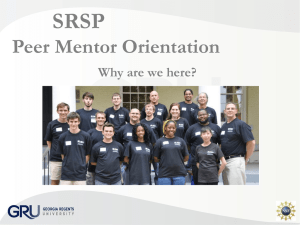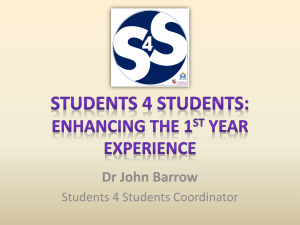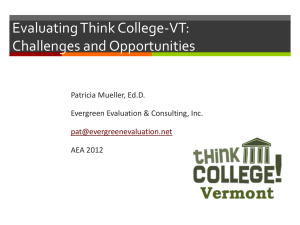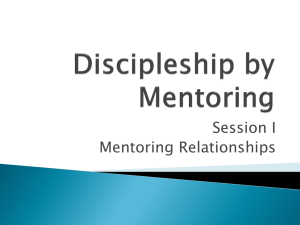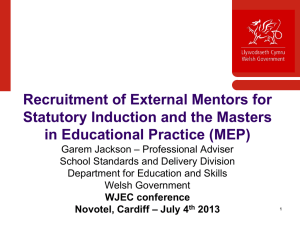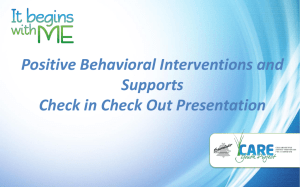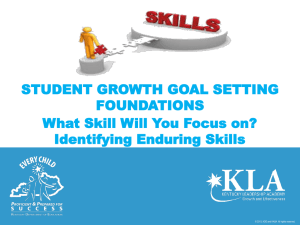Presentation Materials - National Mentoring Partnership
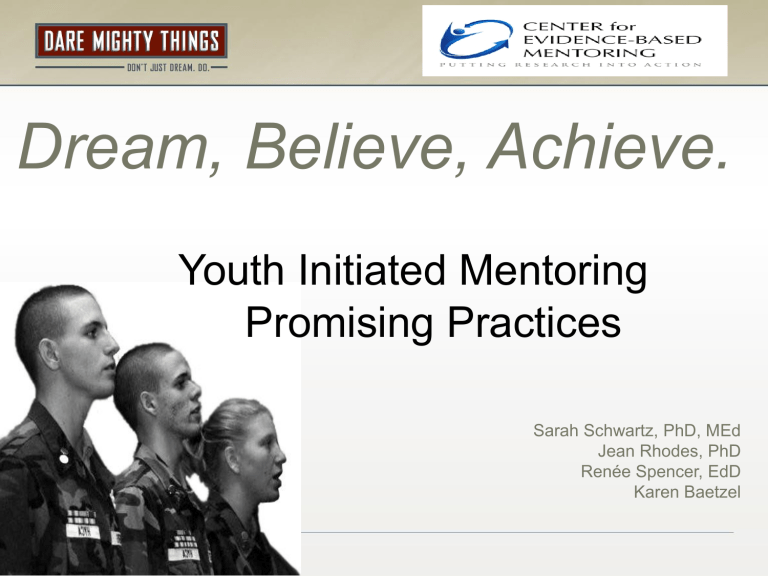
Dream, Believe, Achieve.
Youth Initiated Mentoring
Promising Practices
Sarah Schwartz, PhD, MEd
Jean Rhodes, PhD
Renée Spencer, EdD
Karen Baetzel
Placeholder slide 6 minute intro video on
NGYCP
NGYCP Mission
The mission of the National Guard Youth
Challe NG e Program (NGYCP) is to intervene in and reclaim the lives of 16-18 year old high school dropouts and produce program graduates with the values, skills, education, and self-discipline necessary to succeed as productive citizens.
NGYCP Vision
The National Guard Youth Challe NG e Program will be recognized as America ’ s premier voluntary program for 16-18 year-old high school dropouts, serving all 54 states and territories.
Quasi-Military
8 Core Components
– Academic Excellence
– Physical Fitness
– Leadership/Followership
– Responsible Citizenship
– Job Skills
– Service to Community
– Health and Hygine
– Life Coping Skills
Federal/State Cost Share
Program Elements
NGYCP Locations
NGYCP
No NGYCP
2014
Washington
Oregon
California
Nevada
Alaska
Idaho
Montana
Utah
Arizona
Wyoming
Colorado
New Mexico
North Dakota
South Dakota
Nebraska
Kansas
Oklahoma
Minnesota
Vermont
Maine
Iowa
Missouri
Wisconsin
Illinois
Michigan
Indiana
Kentucky
Ohio
West
Virginia
New York
Pennsylvania
New Hampshire
Massachusetts
Rhode Island
Connecticut
New Jersey
Virginia
Delaware
District of Columbia
Maryland
Arkansas
Tennessee North Carolina
Mississippi
Alabama
Georgia
South
Carolina
Texas
Louisiana
Hawaii
Alaska
Florida
6
Puerto Rico
NGYCP Program Model
Placeholder for mentor video
Cadet buy-in
Program efficiency
Retention
Stronger, durable mentor relationships
Youth outcomes
The Value of Youth-
Initiated Mentoring
Mentoring Standards
1. Post-Residential
Action Plan (P-RAP)
2. Recruiting
3. Screening
4. Mentor Qualifications
5. Training
6. Matching
7. Mentor-Mentee
Contact
8. Case Management
But does it work?
Youth Initiated Mentoring:
I N VE S TI G A TIN G A N E W A PPR OA C H TO
W O R KI N G W I TH VU LN E R A B LE A D O LE S C E N TS
S a r a h S c h w a r t z , P h D , M E d
J e a n R h o d e s , P h D
R e n é e S p e n c e r , E d D
Theoretical Rationale
Youth-Initiated Mentoring
Builds on strengths of natural mentoring
AND provides structure for relationships to develop
Autonomy in selecting mentors may increase motivation and investment, esp. for adolescents
Redresses shortage of volunteer mentors
Methods
Study Participants
Quantitative ( N = 1,173)
10 ChalleNGe sites across the country
Ages 16-18 at baseline
88% male
41% White; 40% Black; 14% Latino, 4% Other
Qualitative ( N = 30)
3 ChalleNGe sites (California, Michigan, Mississippi)
Ages 20-22 at the time of the interview
90% male
63% White; 20% Latino; 7% Black; 7% Mixed Race
Methods
Measures
Baseline Youth and Mentor Characteristics
Demographic characteristics youth (youth self-report)
Demographic characteristics of mentors (mentor self-report from program records)
Relationship Characteristics (youth self-report)
Contact with mentors
Mentor selection method
Outcome Measures at 38 Month Follow Up (self-report)
GED/HS Diploma
College Credit
Binge Drinking
Frequent Marijuana Use
Employment
Time Idle (not in work or school)
Earnings
Convictions
Results
Who are the mentors?
Average age: 46.7 years old
83% same race or ethnicity as their mentee
26% living in same zip code as mentee
93% working full time; 4% retired; 3% unemployed; 1% working part time
Qualitative data indicated mentors were drawn from family friends and extended family, school and afterschool staff, and religious leaders
Results
How were the mentors chosen?
55% youth chose “mostly on their own”
37% parents helped choose
5% ChalleNGe staff helped choose
4% were chosen “some other way” (e.g., mentor asked youth)
Results
Frequency and duration of contact
At 9 month follow-up: 76% participants reported contact with mentors
34% weekly in-person contact
47% weekly contact of any type (e.g. in-person, phone, written)
At 21 month follow up: 74% participants reported contact with mentors
27% weekly contact of any type
At 38 month follow up: 56% participants reported contact with mentors
Results
Outcomes among Youth in Early Terminating Relationships
(Relative to Control) with Propensity Score Matching
Outcome
GED/HS Diploma
College Credit
Months Employed
Months Idle
Earnings ($)
Convicted
Marijuana Use
Binge Drinking
Matchlength < 21 Mos (N = 153)
B/OR SE Significanc e
1.45
1.10
0.21
0.21
-1369.41
1.11
1.48
0.94
0.36
0.28
0.48
0.63
1360.23
0.27
0.36
0.36
Results
Outcomes among Youth in Mid-Length Relationships (Relative to
Control) with Propensity Score Matching
Outcome
GED/HS Diploma
College Credit
Months Employed
Months Idle
Earnings ($)
Convicted
Marijuana Use
Binge Drinking
Matchlength 21 to 38 Mos (N = 138)
B/OR
1.91
1.68
0.56
-2.10
-728.34
0.62
1.14
.1.00
SE
0.49
0.44
0.50
0.66
1428.65
0.17
0.30
0.25
Significanc e p < .05
p < .05
p < .01
p < .10
Results
Outcomes among Youth in Enduring Relationships
(Relative to Control) with Propensity Score Matching
Outcome
GED/HS Diploma
College Credit
Months Employed
Months Idle
Earnings ($)
Convicted
Marijuana Use
Binge Drinking
Matchlength > 38 Mos (N = 359)
B/OR
3.11
3.41
1.51
-3.22
3123.99
-0.63
0.87
0.97
SE
0.60
0.63
0.35
0.46
1008.69
0.12
0.17
0.17
Significance p < .01
p < .01
p < .01
p < .01
p < .01
p < .05
Results
Descriptive Summary of 38-Month Outcomes by Match Length
Outcome
Variable
GED/HS
Diploma
College Credit
Control
(N = 451)
55.0%
18.8%
Treatment
ML > 21 mos
(N = 153)
66.9%
28.8%
Treatment
ML 21-38 mos
(N = 148)
71.0%
31.4%
Treatment
ML < 38 mo
(N = 349)
79.2%
42.4%
7.1
7.9
7.9
8.9
Months
Employed
Months Idle 6.2
5.4
4.4
3.2
Earnings ($) $10,750 $12,463 $11,760 $15,726
Convicted 26.0% 31.4% 23.2% 20.4%
Marijuana Use 24.4% 32.0% 26.1% 23.0%
Binge Drinking 28.0% 26.6% 31.9% 27.0%
Results
What were the processes through which enduring
YIM relationships influenced outcomes?
Results
Supporting Successful Completion of the
Residential Phase
I wanted to quit really, really badly. I even, like I told my mom that I wanted to go home, and that I was gonna get into a fight there, so I could get kicked out, an’ then, uh, I got a phone call from my mentor, and then we had like a, a really long talk about, about why I needed to stay there, and how like, what I needed to do in order to, to stay there , and…that was like the turning point that made me decide that I was gonna like keep trying when I was at the camp.
Results
Supporting Post-Residential Phase Transition
It probably would, it probably would’ve been like, it would’ve been cool, like the whole program an’ everything, but not having a plan for afterwards, or someone you can go talk to, you probably would’a’ just went back to the same, you know, same stuff you were doing… It probably only would’a’ changed you for the six months you were in there, an’ then you would’a’ went right back, like
afterwards.
Results
Social-Emotional Support
“ Because out of the respect I had for him, [it] helped me to respect other people …And that was a big step for me, because I went through a lot, and everybody, it felt like everybody was stabbin ’ me in my back, and then he came along and he was, he was more than a mentor, he was a friend.
”
“Mentoring just, like, that part taught me how to get closer to other people , like how I got closer to [my mentor], and I started also with my family back home. And that would have me acting better…”
Results
Advice and Guidance
“When I would start to slip, my mom would call him, and he’d call me, an’ then it’d be like, ‘oh, well, I’m messing up again’ and then get back on track…so he was there, kinda, to kinda like push me in the right directions sometimes.”
“I went to a community college at first, and she wanted to make sure that I didn’t stop there, she wanted to make sure that
I pursue my career , she wanted to make sure that I wasn’t gonna be pregnant or you know, on drugs, and um, I haven’t, I haven’t let her down on any of that.”
Results
Instrumental Support
“He didn’t have to do all that, an’ he did, an’ he’s still givin’ me these leads, in, you know, in the right direction, when it comes to the jobs, an’ all that . He didn’t have to do all that, that took extra work for him, you know ”
“He was there looking out for me and making sure that I was not going to jail and stuff like that.”
Results
What factors predict enduring relationships?
Mentor selection
Same racial or ethnic background
Mentor Selection
Youth
(n = 360)
Parents
(n = 235)
ChalleNGe
(n = 36)
Other
(n = 24)
Significance
Contact at
21 months
81.4% 71.1% 52.8% 58.3%
2 (3, 655) =
23.0**
Contact at
38 months
59.2% 48.1% 36.1% 41.7%
2 (3, 655) =
13.1**
Results
Most youth reported having similar backgrounds to their mentors
Most youth believed similarity to be beneficial to relationship quality and duration
“We were both raised in the church, both military raised…Everything that we believed in was just about the same, so there are a lotta similarities, and I think that’s why we got along so well whenever I first moved here, and it was one of the main reasons I highly considered him to be my mentor, and that’s why he’s still my mentor till this day .”
Results
Some youth described the benefit of having the same ethnic or racial background as their mentors
“ She understood where I was comin’ from …the way we do things…It got us closer and uh, it helped us understand each other better.”
“ Just to see a, a, a Black man just, in our community, that just basically came up , ‘cause ‘round here mostly don’t see too many like that...makin' money the right way.”
Discussion
In the context of ChalleNGE:
YIM relationships tend to be enduring (relative to traditional formal mentoring)
Mentors chosen by youth and of the same race or ethnicity as mentees were most enduring
Enduring relationships are associated with improved academic, vocational, and behavioral outcomes
But not improvements in substance use
Mentors provided social-emotional support, guidance, and instrumental support
Supported completion of Residential Phase
Supported transition during Post-Residential Phase
Discussion
Potential Benefits of YIM:
Effective with vulnerable adolescents
Fosters skills to recruit adult support
Builds social capital within communities
Potential Limitations of YIM:
Challenges to identifying mentors
May be difficult to achieve consistent weekly contact
Potential negative influence of early terminations
Future Directions for Research
Experimental study of impacts of YIM
Investigate YIM in contexts outside of ChalleNGE
Longitudinal qualitative data
Perspectives of mentors
Future Directions for Practice
“Full” YIM : Train youth in how to recruit mentors; program provides screening and training; monitors relationship
Adult and youth training (group) : Relationships-building workshops for youth and recruited adult to attend together
Youth training (group) : Workshops training youth in how to identify, solicit, and draw on support from adults within their social networks
Formal mentoring to YIM : Formal mentor teaches youth how to identify, solicit, and draw on support from adults within their social networks as part of termination process
Choice in mentor selection : Within formal mentoring, allow youth greater autonomy in choosing mentors
Acknowledgements
The authors gratefully acknowledge Megan Millenky, Dan Bloom and other members of the ChalleNGe evaluation team and the support of the Bill & Melinda
Gates Foundation, Charles Stewart Mott Foundation, Edna McConnell Clark
Foundation, John D. and Catherine T. MacArthur Foundation, MCJ Foundation,
Robert Wood Johnson Foundation, William and Flora Hewlett Foundation and the
U.S. Department of Defense.
